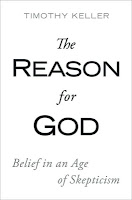Reason for God, VIII
 The sixth objection to Christianity that Keller often faces and thus addresses in Reason for God is the belief that "Science has disproved Christianity," or more aptly stated, "science has disproved the existence of a creator God and consequently, all theistic religions."
The sixth objection to Christianity that Keller often faces and thus addresses in Reason for God is the belief that "Science has disproved Christianity," or more aptly stated, "science has disproved the existence of a creator God and consequently, all theistic religions."It is a much debated question today: are science and belief in God mutually exclusive? Dawkins, Harris, Hitchens and others would urge us to believe so, but severing the two is not so easy and there are many prominent scientists of our day who are firm believers in the creator God of the Bible.
Keller first addresses the belief that miracles are scientifically impossible, because you can't empirically prove their reality. In response, he states that because science requires an experimental model to test everything, how could a scientist test the statement "No supernatural cause for any natural phenomenon is possible."
Next, Keller looks at the question of whether or not science is in direct conflict with Christianity or the Bible. And the answer is "of course, not!" There is no reason that the findings of science, including evolutionary biology (I know, gasp!) cannot be consistent with the loving, omnipotent, creator God whom Christians worship. Yes, there is much debate within Christianity about a literal six-day creation account versus a metaphorical six-day (The sun and moon were created after "days" one, two and three) creation account, but the reality is that while we can and should develop Biblical convictions about creation, we cannot disprove the possibility that God used some forms of evolution to bring forth parts of creation. His ways are higher than our ways.
[Aside: the reality of a creative and loving God makes science and nature that much more beautiful, meaningful, captivating and hopeful. Without an omnipotent, everlasting God, is science not just a search for power? Without God, there is then no such thing as "good" - we each define "good" and science becomes a power struggle to find a piece of reality that will somehow "save us." I guess we all recognize our need to be rescued from something. If physical naturalism is the only explanation for our origin and purpose, then there are no morals, there is no justice, there is no love - we are only animals, the strong taking over the weak. Is that the story that our reality tells us, though? Why would a man jump in front of a moving train to save a stranger? Yes, I've heard an answer: because through evolutionary psychology he has learned that that action will somehow result in a greater benefit to his tribe. ]
Keller closes on a hopeful note: "We modern people think of miracles as the suspension of the natural order, but Jesus meant them to be the restoration of the natural order...Jesus has come to heal the world where it is broken...Jesus' miracles are..a promise...that the world we all want is coming."


Comments